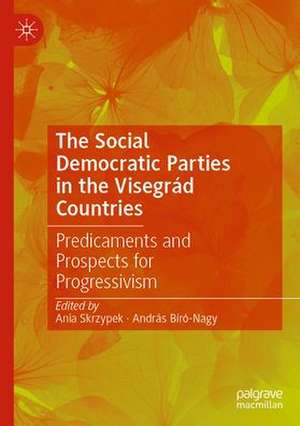The Social Democratic Parties in the Visegrád Countries: Predicaments and Prospects for Progressivism
Editat de Ania Skrzypek, András Bíró-Nagyen Limba Engleză Hardback – 25 iun 2023
| Toate formatele și edițiile | Preț | Express |
|---|---|---|
| Paperback (1) | 736.47 lei 38-44 zile | |
| Springer International Publishing – 25 iun 2024 | 736.47 lei 38-44 zile | |
| Hardback (1) | 782.53 lei 6-8 săpt. | |
| Springer International Publishing – 25 iun 2023 | 782.53 lei 6-8 săpt. |
Preț: 782.53 lei
Preț vechi: 954.30 lei
-18% Nou
Puncte Express: 1174
Preț estimativ în valută:
149.74€ • 163.16$ • 126.18£
149.74€ • 163.16$ • 126.18£
Carte tipărită la comandă
Livrare economică 23 aprilie-07 mai
Preluare comenzi: 021 569.72.76
Specificații
ISBN-13: 9783031307911
ISBN-10: 3031307917
Ilustrații: XXII, 230 p. 29 illus., 26 illus. in color.
Dimensiuni: 148 x 210 mm
Greutate: 0.46 kg
Ediția:2023
Editura: Springer International Publishing
Colecția Palgrave Macmillan
Locul publicării:Cham, Switzerland
ISBN-10: 3031307917
Ilustrații: XXII, 230 p. 29 illus., 26 illus. in color.
Dimensiuni: 148 x 210 mm
Greutate: 0.46 kg
Ediția:2023
Editura: Springer International Publishing
Colecția Palgrave Macmillan
Locul publicării:Cham, Switzerland
Cuprins
1. Introduction.- 2. The Visegrád discomfort: understanding the predicaments of and the prospects for progressivism.- 3. The state of social democracy in the Czech Republic.- 4. The state of social democracy in Hungary.- 5. The state of social democracy in Poland.- 6. The state of social democracy in Slovakia.
Notă biografică
Ania Skrzypek is Director for Research and Training at the Foundation for European Progressive Studies (FEPS), Belgium.
András Bíró-Nagy is Director of Policy Solutions and Senior Research Fellow at the Centre for Social Sciences, Hungary.
András Bíró-Nagy is Director of Policy Solutions and Senior Research Fellow at the Centre for Social Sciences, Hungary.
Textul de pe ultima copertă
This path-breaking volume examines the transformation of social democracy in the four countries of Visegrád. Rich in detail and cogently argued, the work is a major contribution to debates about the changing nature of social democracy across Europe, and will be required reading for scholars and students alike.
Patrick Diamond, Professor of Public Policy, Queen Mary University of London
A group of renowned NGO experts from progressive think-tanks have authored a must-read primer for everyone interested in the challenges of contemporary politics in Europe. From progressivism to illiberalism, the book delivers a particularly insightful glimpse at the political currents of Central Europe. An important contribution to the debate on the future of social democracy in Europe.
Aleksander Kwaśniewski, President of Poland (1995-2005)
This volume is an essential contribution to the European debate about the state and future of social democracy in Central and Eastern Europe. Being completed with academic precision and an excellent understanding of the socio-economic reality of the country case studies, the book is a long-awaited, absolute must-read.
Biljana Borzan, Vice-President of the S&D Group in the European Parliament and MEP
This book provides an in-depth analysis of the social democratic parties in the four member states of the so-called “Visegrád Group”- Czech Republic, Hungary, Poland and Slovakia. The timeline spans the last two decades, which saw the parties in question come to power, govern and collapse. The case studies of all four countries are structured in the same way, offering: explanation of the historical background (including electoral results), analyses of the context, structures, membership and voters; evaluation of the programmes and hypotheses for potential future trajectories. Given the European relevance of the topic, the fifth chapter provides a comparative analysis, with a handful of explanations as to why Visegrád Group countries have proved to be tough partners in European integration processes.
Ania Skrzypek is Director for Research and Training at the Foundation for European Progressive Studies (FEPS), Belgium.
András Bíró-Nagy is Director of Policy Solutions and Senior Research Fellow at the Centre for Social Sciences, Hungary.
Patrick Diamond, Professor of Public Policy, Queen Mary University of London
A group of renowned NGO experts from progressive think-tanks have authored a must-read primer for everyone interested in the challenges of contemporary politics in Europe. From progressivism to illiberalism, the book delivers a particularly insightful glimpse at the political currents of Central Europe. An important contribution to the debate on the future of social democracy in Europe.
Aleksander Kwaśniewski, President of Poland (1995-2005)
This volume is an essential contribution to the European debate about the state and future of social democracy in Central and Eastern Europe. Being completed with academic precision and an excellent understanding of the socio-economic reality of the country case studies, the book is a long-awaited, absolute must-read.
Biljana Borzan, Vice-President of the S&D Group in the European Parliament and MEP
This book provides an in-depth analysis of the social democratic parties in the four member states of the so-called “Visegrád Group”- Czech Republic, Hungary, Poland and Slovakia. The timeline spans the last two decades, which saw the parties in question come to power, govern and collapse. The case studies of all four countries are structured in the same way, offering: explanation of the historical background (including electoral results), analyses of the context, structures, membership and voters; evaluation of the programmes and hypotheses for potential future trajectories. Given the European relevance of the topic, the fifth chapter provides a comparative analysis, with a handful of explanations as to why Visegrád Group countries have proved to be tough partners in European integration processes.
Ania Skrzypek is Director for Research and Training at the Foundation for European Progressive Studies (FEPS), Belgium.
András Bíró-Nagy is Director of Policy Solutions and Senior Research Fellow at the Centre for Social Sciences, Hungary.
Caracteristici
Analyses 3 decades of political developments within the Czech Republic, Hungary, Poland, and Slovakia Explains the rise, the fall, and the fight for the perseverance of the center-left in post-transition countries Investigates the roots of the vulnerability of representative democracies in post-transition countries
